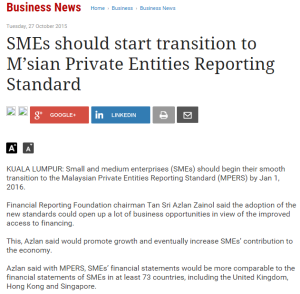New Accounting Standards – Malaysian Private Entities Reporting Standards (MPERS)
We will be conducting a training on the new accounting standards, Malaysian Private Entities Reporting Standards (MPERS), which will be replacing the current PRIVATE Entities Reporting Standards (PERS), beginning 1st of January 2016. The training will be held on the 7th of December 2015, and it will be held in Niniq Bistro at Taman Setia Tropika, from 9.00am. to 6.00pm.
The move to adopt MPERS, a new standard of financial reporting compatible with international norms, should smoothen cross-border investment and trade between SMEs.

This article first appeared on The Star on 27th October 2015.
A common set of accounting standards for small and medium enterprises (SMEs) that is comparable from one country to another is needed to enhance international trade between SMEs, hence the Malaysian Private Entities Reporting Standards (MPERS), which replaces the current Private Entities Reporting Standards (PERS), beginning Jan 1, 2016, would make it easier for SMEs to do business overseas.
During our training, We will be covering several major differences and updates between the current accounting practices under PERS and the upcoming MPERS. The major changes include the following areas:
- Property, plant and equipment
- Intangible assets
- Investment properties
- Trade receivables, trade and other payables (under Financial Instruments)
- Investments (under Financial Instruments)
- Foreign exchange currencies
- Biological assets
- Borrowing costs
We will also be covering on the transitioning process from PERS to MPERS, in order to smooth out the transition works for auditors and the clients.
Please download the registration form as below:
Registration form
GST Updates – New DG Decisions and Amendments
There are some important amendments to previous DG decisions that many businesses should take note of. A summary of the history of amendments can be accessed from the following link:
PDF Link
Also, a new DG decision 8/2015 was issued on 02/11/2015. The topics mentioned are:
- GST on accommodation provided to employees as benefits
- GST treatment on Occupational Health and Safety items given to staff (e.g. safety shoes)
- Definition of “holding an invoice” under the 6 years rule for input tax claim
The DG decision can be accessed from the following link:
PDF Link
In our opinion, more notable updates include:
1) Bad Debt Relief (DG Decision 1/2014):
a) Bad debt relief can only be claimed if the supply is made by a GST registered person to another GST registered person ; and
b) If the bad debt relief is not claimed by the supplier in the immediate taxable period immediately after the expiry of the sixth month, then the taxable person has to notify the Director General (DG) within 30 days after the expiry of the sixth month on his intention to claim at a later date. (wef 28/10/2015) [Previously was only 5 days]
Our analysis: Previously bad debt relief can be claimed for all taxable supplies if debts are outstanding for more than 6 months if there is evidence of sufficient efforts made to recover the debt. Now only supplies to registered persons can be claimed. We anticipate that unless your accounting system is updated to assist in this, this ruling will make it harder to track bad debt relief. More admin work will also be needed to track which customers are GST registered.
2) GST on accommodation provided to employees (DG Decision 8/2015)
a) If furnished accommodation is provided to employees, the supply of accommodation is exempt but the supply of furniture is standard rated. Even if the accommodation is provided for free, GST must be charged on the supply of the furniture. The input tax of the furniture can be claimed.
b) If the accommodation is also supplied for the benefit of family members, any input tax incurred is blocked.
Our analysis: This clarification is not surprising as it is similar to Singapore’s treatment. Employers that provide accommodation should take note if furniture is also provided.
3) GST treatment for Safety equipment provided to staff (DG Decision 8/2015)
i. Safety and security equipment provided by an employer to the employee for free of charge is considered as employee benefit as long as it is stated in the contract of employment.
ii. In the case where the employer supplies safety and security equipment for free of charge to the employee and the supply is not stated in the contract of employment, such supply will not be considered as employee benefit. Therefore, the employer is liable to account for the GST and entitle to claim the input tax incurred on the purchase of such equipment. However, where –
a. the supply of such equipment involves transfer or change of ownership to the employee, such supply is subject to gift rule under item 5(2)(a)of First Schedule of GSTA 2014; or
b. the equipment is subsequently returned to the employer as business asset, the employer is not required to account for the GST.
Our analysis: This DG decision confirms our stand that RMCD will be particular about business assets used by employees. It is therefore important to have an Employment Contract or Handbook that incorporates safety equipment as a clause, as well as other assets (e.g. computers). Otherwise, companies may be exposed to penalties later if they cannot prove such equipment was returned.
